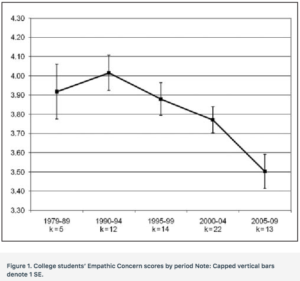SUBSCRIBE TO THIS FINANCIAL MARKETING BLOG
“Starting around 2000, more (college) students say it’s not their problem to help people in trouble, not their job to see the world from someone else’s perspective. By 2009, young people, on average, measure 40 percent less empathetic!”
I hope that got your attention!
The next generation of tellers, loan professionals and new accounts officers are less empathetic.
“College students today are less likely to agree with statements such as, “I often have tender, concerned feelings for people less fortunate than me,” and, “I sometimes try to understand my friends better by imagining how things look from their perspective.”
 The study also found:
The study also found:
- Women tend to score higher than men in empathy
- While not scientific, the samples with a higher percentage of Caucasian participants had lower empathy scores
- There was no significant relationships between economic prosperity and empathy
- Young adults today compose one of the most self-concerned, competitive, confident, and individualistic cohorts in recent history
How Empathy Results in Loyalty & Income
Rosin explains empathy as, “There is a natural way that empathy gets triggered in the brain — your pain centers light up when you see another person suffering.”
In short, empathy is what allows us to walk in someone else’s shoes. Here’s why you should care…
The best chance that a bank or credit union has at significant income and increased customer loyalty is when we are solving a customer’s problems.
To properly solve problems we must:
- Ask the right questions
- Listen for cues
- CARE!
- Have the knowledge to help solve the problem
We need to put ourselves in the customer’s shoes and ask, “if this were me, what would I do?”
We can provide tools and training to help your staff ask the right questions. We can educate them on the cues to listen for. We can teach each product’s purpose, features and benefits.
You cannot coach caring! You cannot educate empathy. You have to hire it.
I would encourage you to add a few empathy-focused questions into your interview. Maybe present a customer problem for the prospective new hire to solve.
Listen for comments like:
- “If it were me…”
- “They must feel like…”
- “I know how they feel…”
- “I can only image what that would be like, but I would…”
If you hear these kind of statements, you might have one of the few remaining empathetic young people in front of you.
SUBSCRIBE TO THIS FINANCAL MARKETING BLOG
Free Marketing e-Book
Free Bank & CU Marketing White Papers
Read Success Stories
See Our Videos
email me directly
937-371-2461
Follow us on Twitter @MarketMatch



